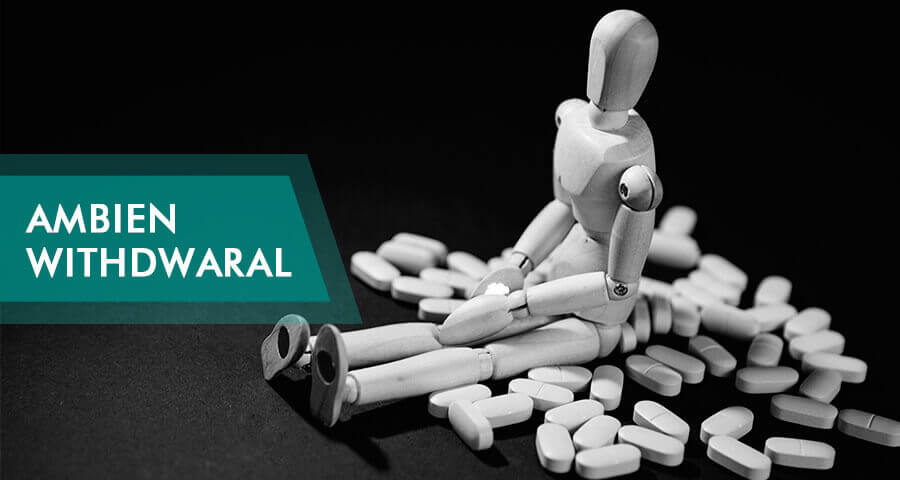
Some of the common symptoms of withdrawal from Ambien include flu-like symptoms such as fatigue, restlessness, nausea, sweating, pains, and abdominal cramps.
Emotional and cognitive symptoms of withdrawal can involve anxiety, mood swings, depression, dysphoria, hallucinations, and memory loss.
In addition, Ambien withdrawal can induce seizures, which can be life-threatening.
Table of Contents
Ambien Withdrawal Timeline?
The Ambien withdrawal timeline will typically last between 1-2 weeks after quitting the drug. The duration of Ambien withdrawal differs between users. Acute symptoms peak within the first 3-5 days of detox, and all adverse effects wear off after the 1-2 week mark. However, some psychological symptoms, such as depression and cravings, can last up to few months.
Ambien Withdrawal Symptoms
Ambien is a popular drug used to treat insomnia. The drug should not be taken over extended periods because it is highly addictive and can lead to dependence and severe side effects. Some people, however, abuse this powerful sedative and experience dangerous withdrawal symptoms.
Some of the common withdrawal symptoms caused by Ambien are:
- Fatigue
- Restlessness
- Vomiting
- Tremors
- Sweating
- Pains
- Abdominal cramps
Some of the psychological effects of Ambien include:
- Anxiety
- Mood swings
- Crying
- Depression
- Dysphoria
Ambien can also cause memory loss and psychosis. There are case studies that explain how Ambien abuse is related to psychosis and schizophrenia, which can become persistent.Rebound insomnia is another uncomfortable effect. Nightmares are also present.
One of the most dangerous aspects of Ambien withdrawal is that the drug can induce seizures. This effect can be life-threatening and can result in death.
Ambien Withdrawal Timeframe
Knowing how long Ambien withdrawal symptoms will be in effect is tricky, depending on the length of treatment, doses of intake, individual factors and other forms of drug abuse.
Usually, Ambien withdrawal lasts up to 1-2 weeks after cessation of the drug.
The acute symptoms can be experienced in the first 3-5 days after detox. However, there are some psychological symptoms, such as cravings, that can last up to few weeks or even months.

Let’s look at Ambien withdrawal duration a little bit closer. The drug has a relatively short half-life, and that’s why some of the first withdrawal symptoms can be experienced in the first few hours after stopping Ambien.
Day 3 and 5 of detox can be characterized by a visible peak of some of the withdrawal symptoms. During the first 72 hours, users might experience confusion, anxiety, hallucinations, vomiting, and insomnia.
After the first week symptoms decrease but some psychological problems, such as drug cravings and depression will be still present. Dealing with insomnia can also be difficult, but usually, after the second week of detox, users return to their normal sleeping patterns.
If a person hasn’t been abusing Ambien for too long or in high doses, they should stop feeling any adverse effects after the third week of detox.
Unfortunately, some people might experience post-acute symptoms up to few months after their last dose.
Again, withdrawal symptoms and their duration are different for each patient. Therefore, always ask a doctor for the right tapering down methods and available treatment options.
Ambien & Medical Help
Like any other sleeping pill, the best way to quit Ambien is tapering down. This process can take a couple of weeks or a few months, depending on individual factors and history of abuse. Going “cold turkey” can be dangerous as it can induce seizures, which can be lethal.
Often health professionals use anticonvulsants to treat seizures. It’s interesting to know that some doctors prescribe benzos such as Valium to help patients reduce their Ambien intake due to its longer half-life. Always ask a doctor for more information about treatment.
Monitoring the emotional state of the patients is crucial because depression can induce suicidal thoughts that can result in real suicide attempts. Social support is needed, and activities that can help a person regulate their sleep patterns naturally should be sought. More active and healthier life could help a person sleep better.
Staying clean is another important aspect of treatment because mixing Ambien with other drugs can be fatal. Treating the hypnotic and sedative effects of Ambien may be challenging, especially in patients with mental comorbidities.
However, quitting Ambien is possible: leading a sober life without suffering from insomnia is not only a dream!
Page Sources
- https://www.ncbi.nlm.nih.gov/pmc/articles/PMC4354222/
- https://www.ncbi.nlm.nih.gov/pubmed/16096519


 Written by:
Written by: 

 FindTreatment.gov
FindTreatment.gov